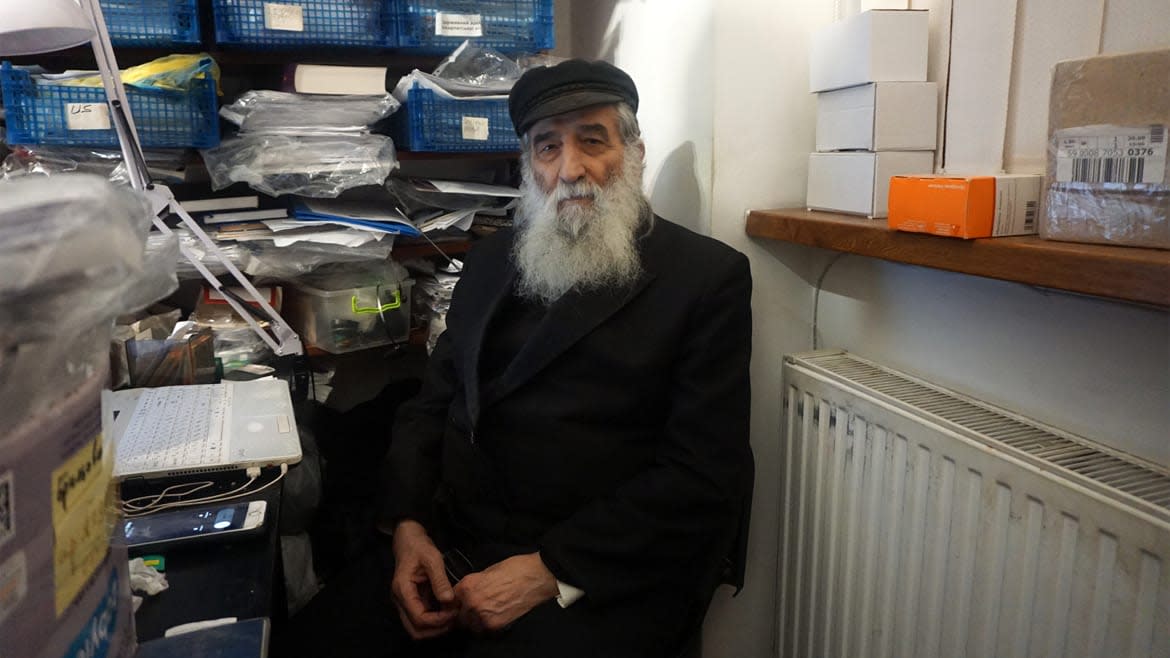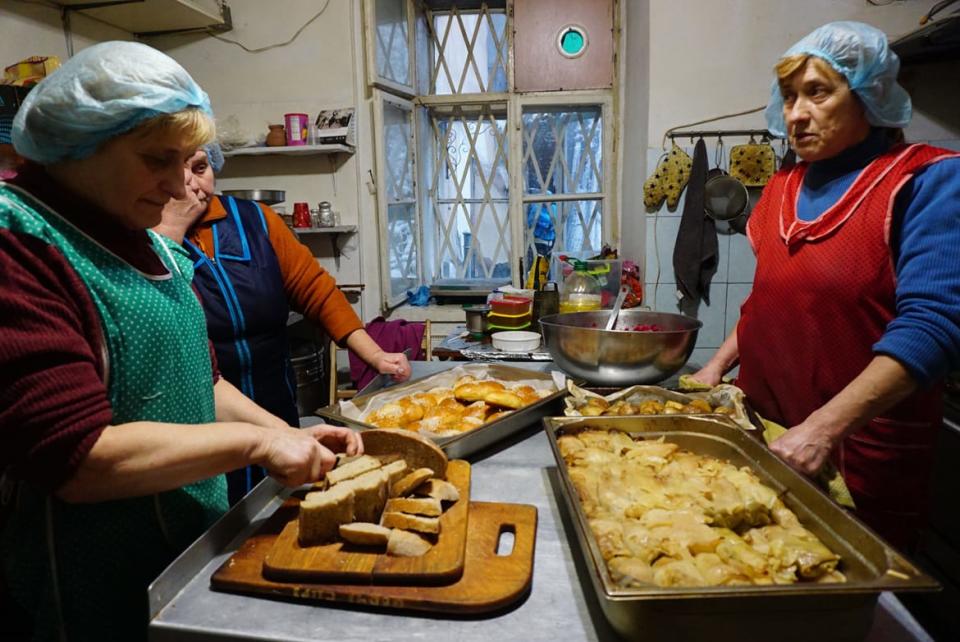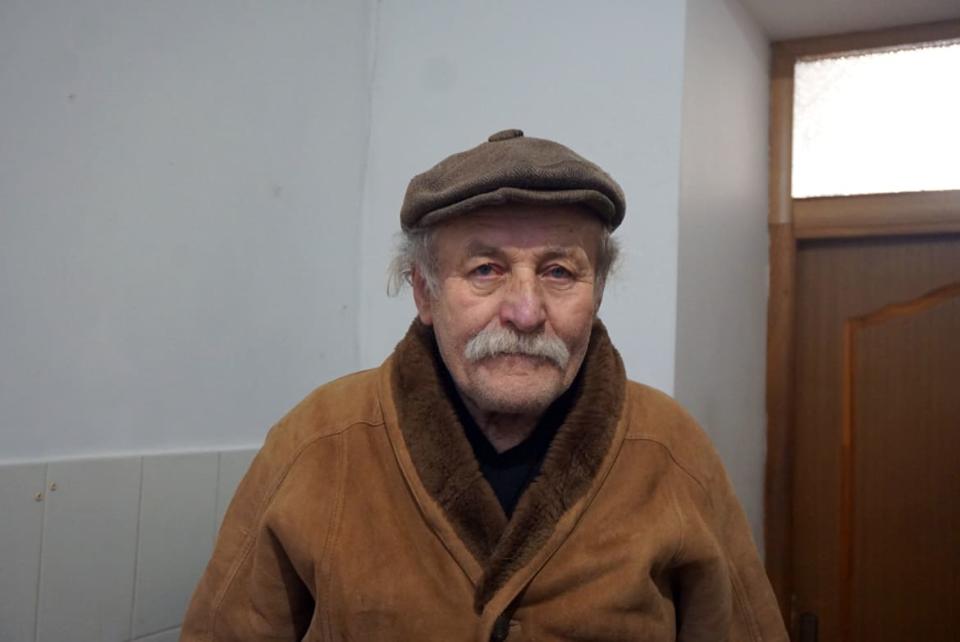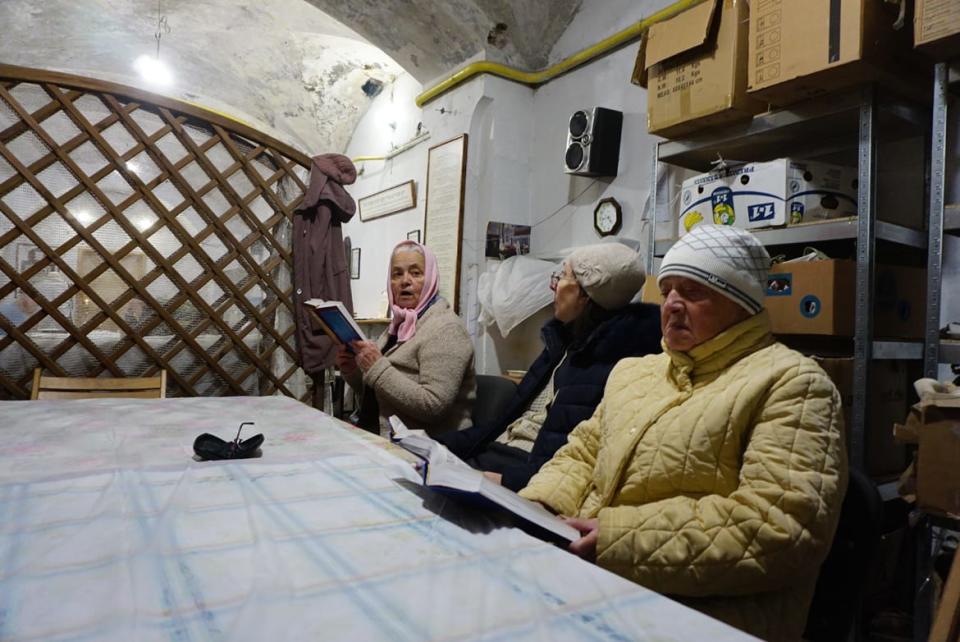Putin Threatens New Disaster for Soviet Horror Survivors

- Oops!Something went wrong.Please try again later.
LVIV, Ukraine—Vladimir Putin has consistently used the oppression of Jews to justify his full-scale invasion of Ukraine. While countless Ukrainian cities are burned to the ground, and civilian casualties continue to rise, the Russian president has claimed that his war has been made in the name of de-nazifying the neighboring country. Instead, it has invoked the horrors of World War II into the lives of Russia’s public.
Few Jewish communities in Ukraine have been depleted like that in Lviv, the once vibrant cultural hub for the religion. But, with a population of just 1,500 before February 24, the war in Ukraine raises concerns about the future of the city's ties to the community and if it will be able to survive, and a fear of what Putin’s wrath might bring.
“He wants to restart the spread of communism in the world, and he wants to establish a bank system in the Soviet-style,” Meylakh Sheykhet, Director for the Ukraine Department of the Union Council of Soviet Union Jews, told The Daily Beast. “Ukrainian people, we already tasted the taste of freedom. We don’t want to be under Putin. And especially, we’re afraid of him coming back. And bring back the Soviet system of watching people, monitoring people, and leaving [us] afraid to not have any justice to keep their freedom.”
“Behind the curtains”
The plight of the Lviv Jew began during World War II, which essentially erased the religion from the city's streets. Jews in Lviv made up one-third of the city's population, with 150,000 calling it home. But while in other European countries, Jews were forcibly sent to concentration camps, those in Ukraine were often rounded up and shot on their streets.
At first, some Ukrainians were involved with the Organization of Ukrainian Nationals, which allied with the Nazis, helping round up Jewish people in Lviv and other cities. That paved the way for Putin's claims of Neo-Nazis running the country, despite President Volodymyr Zelenskyy being Jewish. But the support quickly changed in Ukraine, and alongside Poland, no two countries suffered more from the Nazi regime.
Then came the rule of Joseph Stalin, and in Soviet-controlled Ukraine, atheism was the designated religion, and practicing Judaism was forbidden. What resulted from the oppression was a lack of understanding of Jewish culture, and after the Iron Curtain fell, many lost all ties to the religion.
“That's the Phenomena of Jewish people,” says Dr. Vladyslava Moskalets, a Jewish Historian with The Center For Urban History in Lviv. “At Soviet Union, you know that you are Jewish, but what does it mean? You don't know prayers. You don't know the language, you know, perhaps some Jewish jokes. So they knew that there was something like Yiddish language, but they stopped being interested in it.”
Only a small percentage of families defied Soviet laws, but Sheykhet recalls his family practicing Judaism in secret. “There was horrible oppression. We were able to [observe] behind the curtains, we kept it in secrecy, but we observed. It was very difficult. Whoever was observant was fired from their job. Jews suffered in the Soviet Union the second holocaust, which was spiritual. Nazis killed millions of Jews physically. The communist ideology killed them spiritually.”
Sheykhet spoke with The Daily Beast at Turei Zahav Golden Rose Synagogue, which is operated by Lviv's Hasidic community. Since the full-scale invasion of Ukraine began, it has operated a soup kitchen, which provides two meals a day for the country's refugees. It's 10 in the morning and snowing, but the dining hall of the Synagogue offers shelter from the storm, and I am handed a warm coffee and a bowl of soup. “There is a saying: First you invite a guest to eat, and then you ask him to pray,” Sheykhet said.

(L-R) Mariya Maksymovych, Emilia Kovalchyk and Olga Lozynska prepare Shabbat service dinner and the second meal for the Synagogue’s soup kitchen. The majority of refugees the kitchen serves are homeless and coming from the east.
Women in the kitchen of the Synagogue run around in a hurry, checking to make sure the borscht is just right and that the bread has been made, and laughing with one another while they work. They then bring out trays of food to those huddled around a large brown table to receive their free meal—many refugees are homeless and coming from the east. But most of them are not Jewish, and the activity cannot make up for the numbers that the Synagogue has lost.
In an office on the building's grounds, Anatoliy Melamed tells me that the Golden Rose has become desolate since the war began. “According to Jewish law for reading Torah, at least ten men should be present, but in our community, it is a problem. Most of the religious services, three, four, five men are present,” he says. The depleting size, in addition to an increase in ethnic Jews who do not observe, is a concern for Melamed.
“I worry about the future of [my] community. I would like for more young people to be active in religious life,” he said.

Anatoliy Melamed worries about what the depleting size of his community means for the future of Jews in Lviv.
Pulling together
Echoes of a Ukraine with a depleting Jewish population are felt throughout the country. Alla Zaitseva was three-years-old when World War II began. Her family was Jewish and lived in Sevastopol, Crimea. Zaitseva's father worked in Ukraine’s Ministry of Internal Affairs, and her mother was an accountant. Sevastopol fell under military bombardment in just days, Zaitseva recalls, and her mother brought her to her grandparents in the small town of Belogorsk, under two hours away. The attempt was to bring Zaitseva somewhere safe, out of reach of the Nazi Regime.
But no part of Crimea was spared from German occupation, and Zaitseva's grandparents, who were Krymchak, ethnic Crimean Jews, were “In the view of the German fascist subject to destruction,” she says. Zaitseva says her grandmother knew that “Everyone was doomed to death and tried to save not her children, but her granddaughter,” who did not have a Jewish name, thus had a chance of surviving.
As Nazis took Zaitseva’s family to mobile gas chambers, her grandmother screamed: “This is not my child, someone else's, a Russian child.” And the police took Zaitseva away, saving her from the fate of her family.
“I ended up in the [police] office where I sat for a long time, unimportant to anyone. The translator who worked there took me to his family. His name was Vsevolod Semenovich, he and his wife, Ekaterina Venediktovna, were teachers. My memories of that time are very fragmented, as I was very small.”
Holocaust Memorial and TV Tower Attacked in Putin’s Sham ‘Anti-Nazi’ War
She added: “They saved me, a risk of their lives. It was very dangerous to hide Jews, and they passed me off as their daughter, although they were no longer young in age, and I did not look like them.”
Zaitseva was seven when the war ended and was able to reunite with her parents, who thought she had died along with the rest of their family. They remained in Ukraine throughout the Soviet Union, but Zaitseva never practiced Judaism. After the Soviet Union collapsed, she tried to expose her children to their Jewish heritage, but “it was very difficult. I wanted my children to go to Israel, but there were no documents confirming Jewish roots. All archives of Belogorsk were burned by the Germans, who tried to hide their crimes,” Zaitseva says.

Women attend Shabbat service at the Turei Zahav Golden Rose Synagogue on a Friday evening.
Much like the Nazi regime, Putin’s war appears to be aimed to erase Ukraine from existence. President Joe Biden has characterized the Russian leader as a “dictator” and accused him of causing a “genocide.” Fear of meeting Russia's wrath has caused nearly eight million Ukrainians to flee their homes. Though many have flocked to Lviv, at least twenty-five percent of the Jewish community have left, according to Oleksander Nazar, Head of the Lviv Society for Jewish Culture.
But Nazar is adamant that Jews will return to Lviv when the war ends, breaking away from its past. “The community has pulled together more in the face of the challenges of the times. In my opinion, the Jewish community has great prospects in a free and strong Ukraine, and there is a lot of work for the members of the community.” he said. “But for this to happen, we need to win the current war.”
Get the Daily Beast's biggest scoops and scandals delivered right to your inbox. Sign up now.
Stay informed and gain unlimited access to the Daily Beast's unmatched reporting. Subscribe now.

